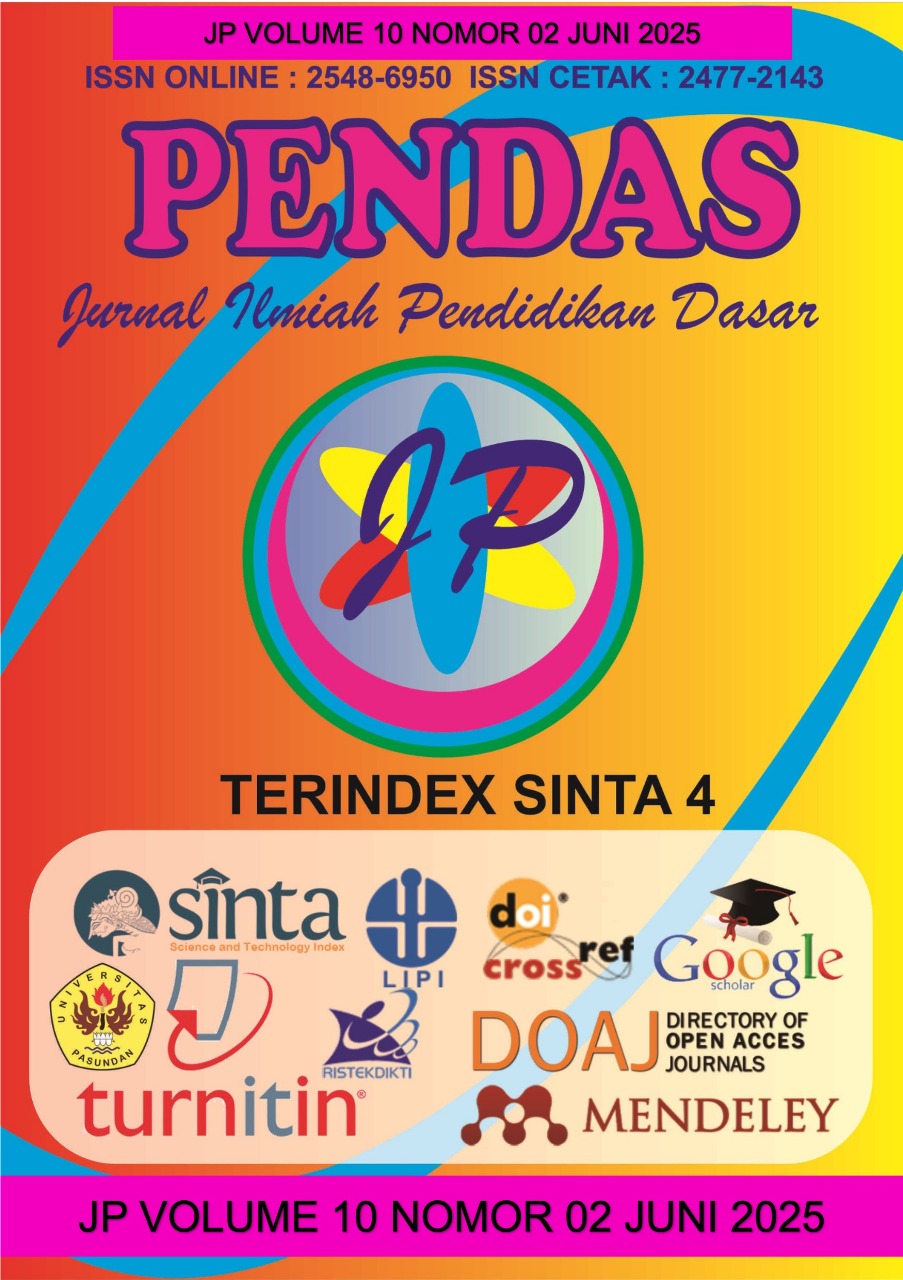PERSEPSI PEMUSTAKA TERHADAP TRANSFORMASI PERPUSTAKAAN BERBASIS INKLUSI SOSIAL (TPBIS) DI PERPUSTAKAAN DAERAH KABUPATEN PASAMAN
DOI:
https://doi.org/10.23969/jp.v10i2.24338Keywords:
social inclusion, public services, user perception, library transformationAbstract
This study aims to describe library users’ perceptions of the Social Inclusion-Based Library Transformation (TPBIS) at the Regional Library of Pasaman Regency. The background of this research stems from the community’s limited understanding of the inclusive services provided, as well as the perception that the training programs offered by the library are not relevant to their needs. Additionally, the TPBIS facilities are still underutilized by the public. This research uses a descriptive quantitative approach with a total of 52 respondents. The main instrument used was a questionnaire that had been tested for validity and reliability. The results of the study indicate that library users’ perceptions of TPBIS are categorized as satisfactory, with an average score of 3.50. These findings suggest that the transformation of the library has had a positive impact on community satisfaction and participation. discipline and publisher requirements. Abstracts are typically sectioned logically as an overview of what appears in the paper.
Downloads
References
Adnan, Achirudin Saleh (2018). Buku Pengantar Psikologi. Sulawesi Selatan : Aksara Timur
Affa Iztihana, Mecca Arfa. (2020). Peran Pustakawan MTs N 1 Jepara Dalam Upaya Mengembangkan Minat Kunjungan Siswa Pada Perpustakaan. Jurnal Ilmu Perpustakaan 9, no. 1
Bimo Walgito. (2010). Pengantar Psikologi Umum. Yogyakarta
Fitriani, A., & Mustika, N. (2021). Persepsi Pemustaka terhadap Program Inklusi Sosial di Perpustakaan Umum Kota Yogyakarta. Jurnal Kajian Informasi & Perpustakaan, 9(1), 45–56. https://doi.org/10.31294/jkip.v9i1.2021
Fitriani, L. (2021). Persepsi Masyarakat terhadap Inklusi Sosial di Perpustakaan Umum. Jurnal Ilmu Perpustakaan, 15(2), 115–126.
Ghony, M.D. dan Almanshur, F. (2012). Metodologi Penelitian Kualitatif. Yogyakarta: Ar-ruzz Media.
Hiekkanen, K., Pekkala, A., & Collin, J. (2015). Improving strategic alignment: A case study. Information Resources Management Journal (IRMJ), 28(4), 19-37.
Higgins, Susan.(2017). Managing Academic Libraries Principles And Practice. Elsevier. Ltd. All rights reserved.
Husaini dan Noor. (1981). Himpunan Istilah Psikologi. Jakarta : Mutiara
IFLA. (2015). Trends Report 2015: Riding the Waves or Caught in the Tide? International Federation of Library Associations and Institutions. https://trends.ifla.org
Indonesia, P. N. R. (2007). Undang-Undang Republik Indonesia Nomor 43 Tahun 2007 Tentang Perpu
Kotler, P., & Keller, K. L. (2009). Manajemen pemasaran (Edisi ke-13, Terj. Bob Sabran). Jakarta: Erlangga.
M Solihin Arianto, A., & Ahmad, S. (2012). Isu-isu Pengembangan Perpustakaan Digital di Indonesia.
Moleong, L. (2015). Metodologi penelitian kualitatif (Edisi revi). Bandung : PT Remaja.
Moleong, Lexy J. (2004). Metodologi Penelitian Kualitatif. Bandung: PT. Remaja. Rosdakarya.
Mustika Pustaka. (2020). Tujuan Perpustakaan Umum.
Mustofa. (2018). Digitalisasi Koleksi Karya Sastra Balai Pustaka Sebagai Upaya Pelayanan di Era Digital Natives. Jurnal Pustaka Universitas Airlangga-Vol.8 No 2 Juli-Desember.
Perpusnas RI. (2020). Pedoman Transformasi Perpustakaan Berbasis Inklusi Sosial.
Perpustakaan Nasional Republik Indonesia. (2019). Pedoman Umum Transformasi Perpustakaan Berbasis Inklusi Sosial. Jakarta: Perpusnas.
Rahmatullah. (2014). Persepsi Mahasiswa terhadap Pengguna Produk Helm Merek GM (Studi Kasus pada Mahasiswa Program Studi Administrasi Bisnis). Palembang: Polsri.
Rahmawati, R. (2021). Persepsi Masyarakat terhadap Peran Inklusif Perpustakaan Umum di Era Digital. Jurnal Ilmu Perpustakaan dan Informasi, 10(2), 115–125
Rogers, E. M. (2003). Diffusion of Innovations (5th ed.). New York: Free Press.
Sugiyono. (2019). Metode Penelitian Kuantitatif, Kualitatif, dan R&D. Bandung: Alfabeta.
Sumanto. (2014). Psikologi Umum. Yogyakarta: CAPS
UNESCO. (2017). Literacy for Sustainable Development: A Global Framework. Paris: United Nations Educational, Scientific and Cultural Organization.
Varheim, A. (2014). Trust in Libraries and Trust in Most People: Social Capital Creation in the Public Library. Library Quarterly, 84(3), 258–277.
Wahyuningsih, Endang (2021) Digitalisasi Bisnis Sebagai Alternatif Scale Up Strategy Umkm Dan Koperasi Menyongsong Era The Next Normal (Pasca Pandemi Covid-19). In: Book Chapter Strategi Pengembangan Kinerja Koperasi dan UMKM. Institut Manajemen Koperasi Indonesia, Jatinangor, pp. 15-24. ISBN 978-623-94471-5-1
Widhi, Dhebertus P. (2016). Peran Pelayanan Anak di Kantor Perpustakaan Arsip dan Dokumentasi Kabupaten Sukoharjo dalam Visi Mencerdaskan Bangsa serta Pengenalan Perpustakaan kepada Anak Usia Dini.
Winarno, M. E. 2013. Metodologi Penelitian Dalam Pendidikan Jasmani. Malang: Universitas Negeri Malang (UM Press).
Wulandari, L., & Hamid, S. (2020). Kolaborasi Sosial dalam Program Inklusi Perpustakaan Daerah. Jurnal Pustaka dan Informasi, 8(2), 66–78. https://doi.org/10.5678/jpi.v8i2.2020
Downloads
Published
Issue
Section
License
Copyright (c) 2025 Pendas : Jurnal Ilmiah Pendidikan Dasar

This work is licensed under a Creative Commons Attribution 4.0 International License.














































